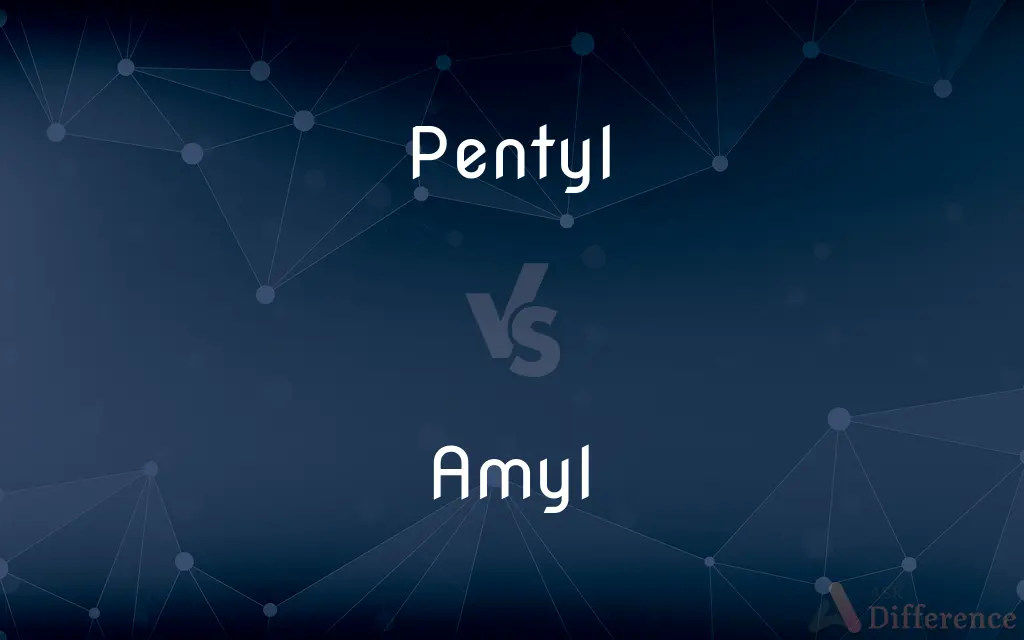Pentyl vs. Amyl — What's the Difference?
By Urooj Arif & Fiza Rafique — Updated on April 17, 2024
Pentyl and amyl both refer to a five-carbon alkyl group in organic chemistry, but "amyl" is more commonly used in older chemical names and commercial contexts.

Difference Between Pentyl and Amyl
Table of Contents
ADVERTISEMENT
Key Differences
Pentyl is a term used in IUPAC nomenclature for organic chemistry to denote a five-carbon straight-chain alkyl group, specifically in more systematically named compounds. Whereas, amyl is often used in less formal contexts and in the names of substances like amyl nitrate.
The structure referred to by pentyl can vary slightly depending on its chemical context (e.g., n-pentyl, iso-pentyl), indicating different structural isomers. On the other hand, amyl traditionally refers to a mixture of isomers, not just a single structural form.
In academic and research settings, pentyl is preferred for clarity and specificity, especially in scientific publications and discussions. Conversely, amyl is still used in industry and commerce, particularly in products and applications where precise structural information is less critical.
The usage of pentyl has increased in recent years as a result of a push for more standardized and systematic chemical nomenclature. Meanwhile, amyl remains in use in certain older or more traditional chemical names, such as amyl alcohol, which is common in both historical texts and certain industries.
Chemical suppliers and databases may list compounds under both names, but the more formal and recent listings will typically favor pentyl if the compound involves a clearly defined five-carbon chain. In contrast, amyl may appear in more diverse contexts, including historical formulations and commercial products.
ADVERTISEMENT
Comparison Chart
Nomenclature
Preferred in IUPAC naming
Used in traditional naming
Structural Isomers
Specific isomers identified
Often refers to a mix of isomers
Usage Context
Academic, research
Industrial, commercial
Example
N-pentyl chloride
Amyl acetate
Chemical Formula
C5H11
C5H11 (generally same, context dependent)
Compare with Definitions
Pentyl
A five-carbon alkyl group used in modern chemical nomenclature.
The pentyl group is attached directly to the main chain.
Amyl
Often used in the context of mixtures or general references.
Amyl alcohol consists of several structural isomers.
Pentyl
Indicates a straight-chain in its normal form (n-pentyl).
N-Pentyl forms a longer, straighter chain than its isomers.
Amyl
Found in both natural and synthetic products.
Amyl esters contribute to the fragrance of certain fruits.
Pentyl
Found in various chemical compounds.
The pentyl linkage plays a crucial role in the molecule's properties.
Amyl
Refers to the commercial and less formal uses of five-carbon groups.
The term amyl is common in manufacturing and industry settings.
Pentyl
Comes in several isomers including n-pentyl and iso-pentyl.
Iso-pentyl is more branched than n-pentyl.
Amyl
Used in older chemical nomenclature.
Amyl butyrate is an older term still used in some commercial products.
Pentyl
Often used in systematic chemical names.
Pentyl alcohol is an alternative name for amyl alcohol in scientific articles.
Amyl
A traditional term for a five-carbon alkyl group.
Amyl nitrate is used for various industrial applications.
Pentyl
Relating to or being a hydrocarbon unit, C5H11, that can occur as a substituent in an organic compound or as an ion or radical. Several isomeric forms are possible.
Amyl
Pentyl.
Pentyl
(organic chemistry) Any of several isomeric univalent hydrocarbon radicals, C5H11, formally derived from pentane by the loss of a hydrogen atom.
Amyl
Synonym of pentyl
Pentyl
The hypothetical radical, C5H11, of pentane and certain of its derivatives. Same as Amyl.
Amyl
(informal) amyl nitrite
Amyl
Of or pertaining to starch
Amyl
A univalent hydrocarbon radical, C5H11, of the paraffine series found in amyl alcohol or fusel oil, etc.
Common Curiosities
How is amyl different from pentyl?
Amyl is a more traditional term that often refers to mixtures of isomers and is used in less formal contexts.
Are pentyl and amyl interchangeable?
While both refer to five-carbon groups, they are not always interchangeable due to different contexts and usages.
Why has the use of pentyl increased in scientific contexts?
The use of pentyl has increased due to a push for more standardized and precise chemical nomenclature.
What does pentyl refer to in chemistry?
Pentyl refers to an alkyl group consisting of five carbon atoms, used in systematic chemical nomenclature.
What are some common uses of amyl compounds?
Amyl compounds are used in fragrances, flavorings, and industrial applications.
Can amyl be used in scientific research?
Amyl is used, but pentyl is preferred for clarity in modern scientific research.
What are the isomers of pentyl and amyl?
Both have several isomers, but pentyl specifically distinguishes between them like n-pentyl and iso-pentyl.
How are pentyl and amyl labeled in chemical products?
Pentyl is used in more formal and recent product labels, while amyl may appear in older or less precise listings.
Is amyl alcohol the same as pentyl alcohol?
Amyl alcohol and pentyl alcohol generally refer to the same compound, though amyl can indicate a mixture of isomers.
What role does pentyl play in organic synthesis?
Pentyl groups are important in modifying the properties of molecules in organic synthesis.
Share Your Discovery

Previous Comparison
Peg vs. Stake
Next Comparison
Estradiol vs. EstrogenAuthor Spotlight
Written by
Urooj ArifUrooj is a skilled content writer at Ask Difference, known for her exceptional ability to simplify complex topics into engaging and informative content. With a passion for research and a flair for clear, concise writing, she consistently delivers articles that resonate with our diverse audience.
Co-written by
Fiza RafiqueFiza Rafique is a skilled content writer at AskDifference.com, where she meticulously refines and enhances written pieces. Drawing from her vast editorial expertise, Fiza ensures clarity, accuracy, and precision in every article. Passionate about language, she continually seeks to elevate the quality of content for readers worldwide.
















































